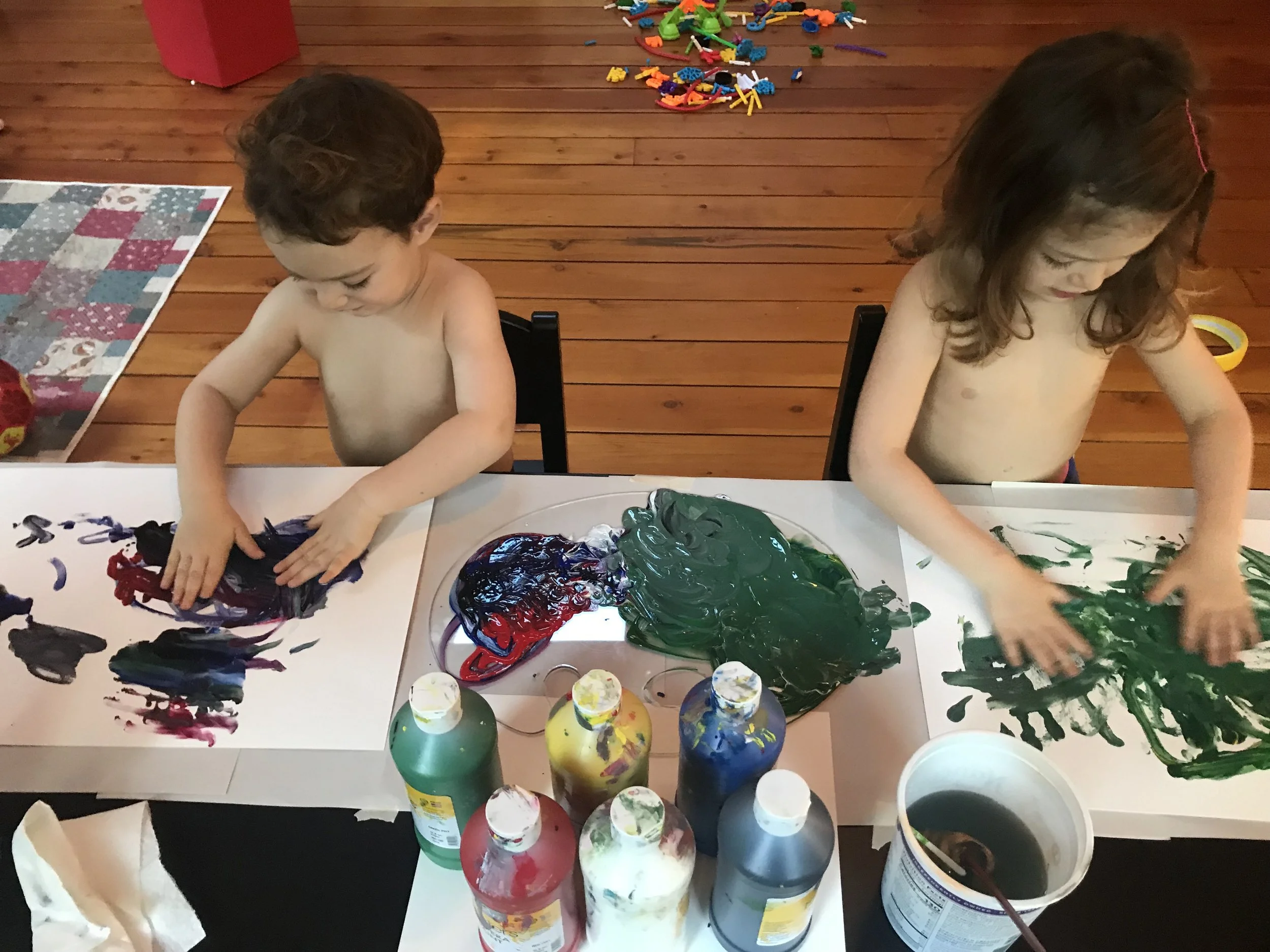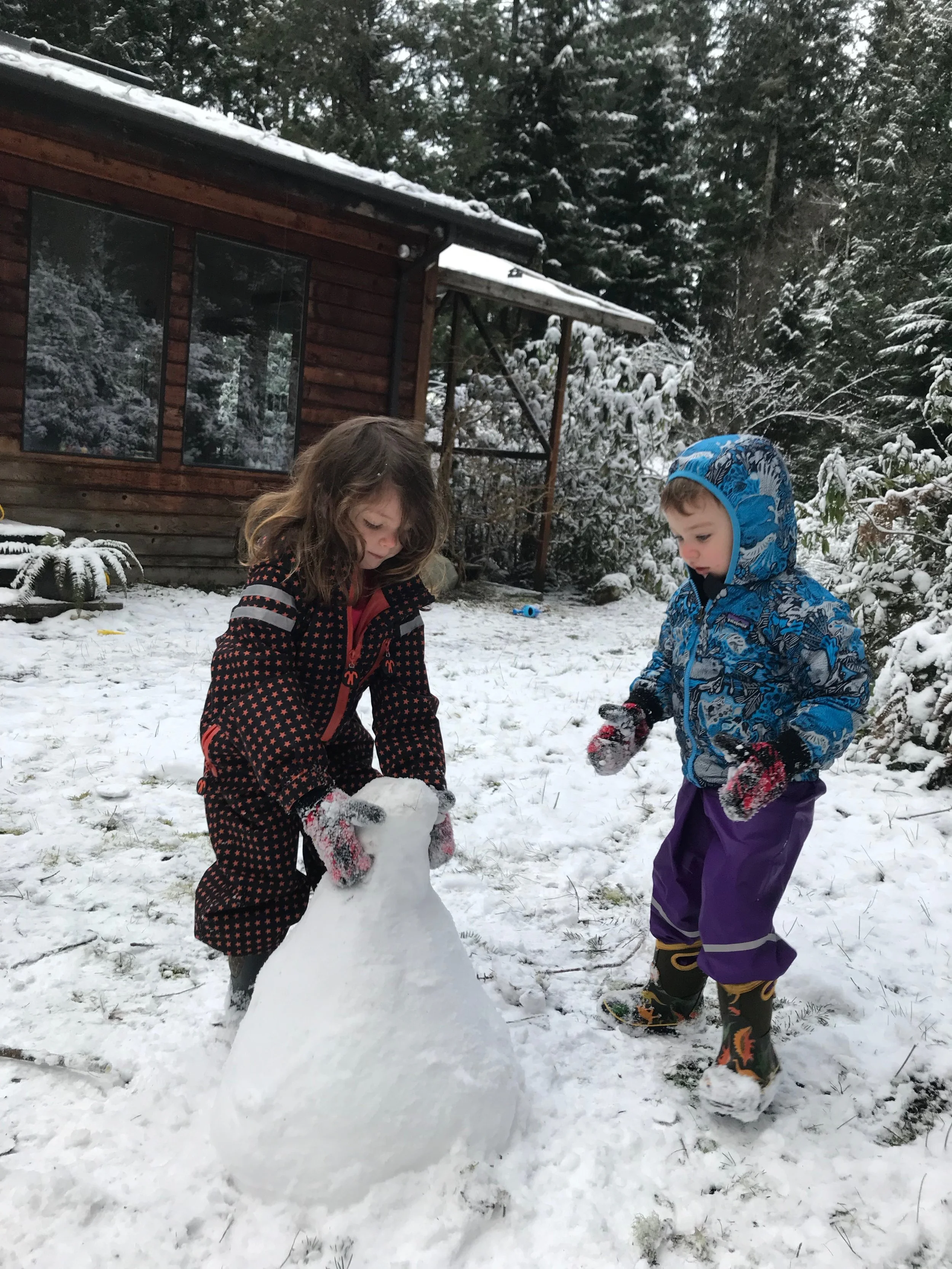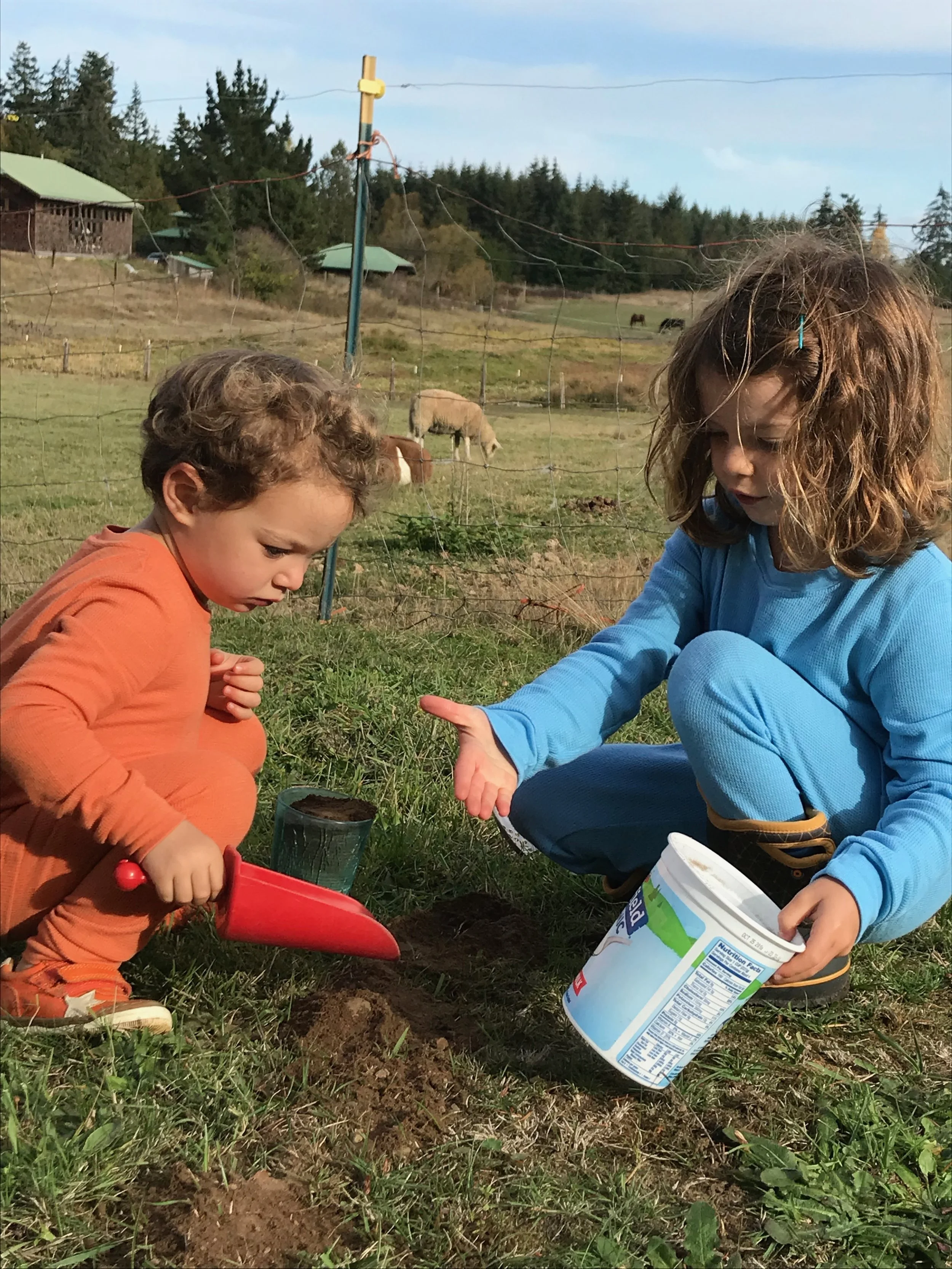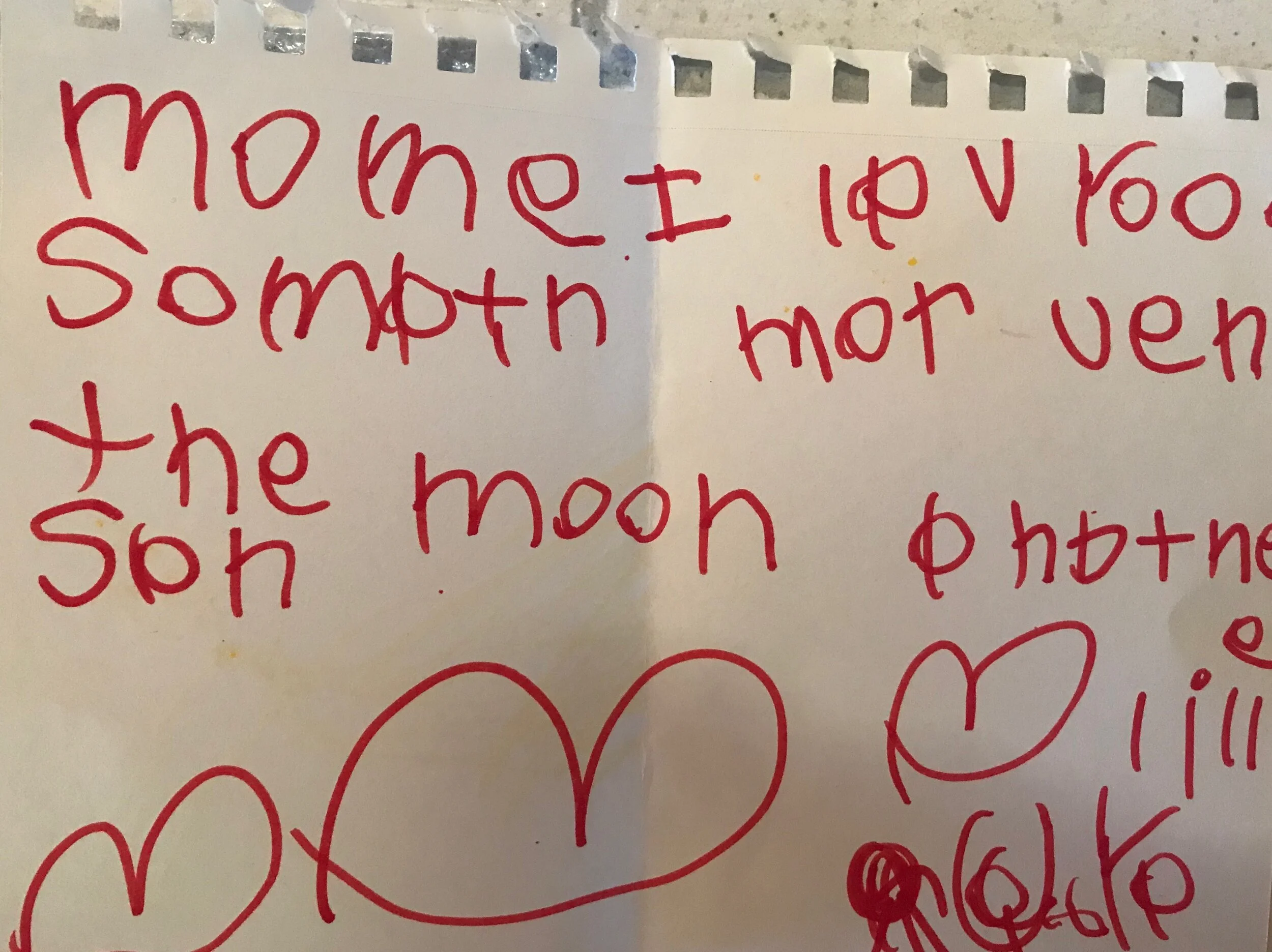Homeschooling a three and five year old
I believe that hybrid versions of homeschooling are going to be the way of the future. The deeper I explore, learn and experiment, the more I am convinced. For families where a parent or caregiver can be at home most of the time, it already works. Work is becoming more and more remote, often home based, making this kind of option more viable. With the addition of tutors and online learning, community programs and school cooperatives, home schooling may transform into something transformative for culture. This would require change on two fronts, in the home and in eduction. That hits at how we think we should be parenting and what being a parent means. It will abolish the mechanistic and severely outdated education system in place. It may even make room for some truly magical new ideas about learning - most often found in early/primary school initiatives - to push through into how we teach teenagers.
For now my experience is mostly isolated. Whilst the US is fairly tolerant of home schooling it is by no means the norm. I did find Washington State to have many pockets of incredible home school communities. In Port Townsend I found a school that provides classes a few times a week, as a drop off program, for independent (read home schooled) learners. Their classes include prehistoric digs and learning what algae is edible on the shoreline. There are plenty of one or two day weekly nature class drop off programs, and many cooperatives founded by parents, but these are mostly not drop off. This goes to the central issue against home schooling in many peoples minds: where do I put my kids when I don’t want or cannot have them around? A question partly answered by a mixture of tools instead of one concrete building: parent teaching, tutors, community classes, cooperatives, online learning etc
It is not easy to homeschool. If you are a stay at home mom or dad it means unless you make a break for yourself there is none. It also means the burden of responsibility for your child’s learning rests on you. Working parents don’t get to see their children all day, and they also don’t have to deal with them all day. Whilst its taboo many parents find this a huge relief because children may be angels but they are also monsters and very, very exhausting. But it is not easy to send kids to school either. Whilst the responsibility for learning is offloaded you also do not know what is happening to your child at school either. Educational systems in most parts of the world are so backward, and as schools like Lambard gain steam they will prepare the child less and less well.
But the biggest challenge I have found this last year is that if you send your children to school, you get to outsource a huge amount of disciplining. I sometimes look at a blog or read a syllabus, always reflecting on the mirage of how obedient the children seem. My children are not obedient like that. It isn’t like I just say ok now let's sit down and do main lesson and they all run to sit quietly and nod their heads to all I say. I have had to build my discipline muscle and get more creative. This is good in both ways. It means my children have to listen to my authority when I assert it, I have to choose those moments not all of the time, and I have to learn just as much as they do. It is the latter which is perhaps the most exciting part. I get to be curious with them and fight out of the stiff blocks in my head.
I do not do much academic stuff. But I am not so free form that I just let it all be play. My main orientation in the last six months has been to teach my daughter to read. She will be reading by the age of six at this pace. My compulsion came from seeing her pour over books and her capacity to dream stories. One of the most powerful parts of home schooling is that the learning gets adjusted to the child. Ruya clearly wants to read even if she doesn’t know it, so that is what we are focusing on now.
That said my agenda doesn’t always dovetail with hers. When we started I decided to do the lesson just after breakfast. This has sustained. I am able to get her before she gets lost in a game and with the satiation of yummy food in her system. I make her a cup of tea and we work. It took around four weeks for this to seem normal to her, as in expecting a reading lesson. We eventually settled into five days on and two days rest. But I adapt as needed. On most days she will do her reading lesson without much complaint. I often overhear her reciting words and trying to write words throughout the day. On some days she hates her reading lesson and we battle. Mostly I sit stoic through these battles and keep calm. Sometimes I lose it and scream. We always finish the lesson. Whilst I may be too strict at times my attitude has been that this homeschool thing is not going to work for me and her, unless she can adapt to my discipline in the moments I call for it. Every time I have had to be hard arsed about doing the lesson it has ended well. She might cry a bit in rebellion but she sits up and does it, feels good about having done it, and despite it all we hug and love. I think conflict resolution is not about not fighting - though picking the right battle is ideal - but more about being able to fight AND make up. We always make up.
I did a bit of research but mostly my curricula choice for reading has been intuitive. To teach the nuts and bolts of reading I am using: “Teach your child to read in 100 easy lessons.” It is brilliant. I was able to teach her using this book with no experience and it worked from the first lesson. It is not used in schools, which is a huge pity. After we finish the lessons I will move onto some lovely Montessori first readers, a few workbooks for English, some moveable alphabet block readers and sight cards. Then I let go and she will read and read and read. At that point I will get her a kindle.
Beyond the reading lesson I am very flexible. I attempted to introduce a main lesson mid morning but my children are not into that kind of structure, not yet. I will introduce the main lesson (based on the Waldorf type system) in time. For now I pull stuff in spontaneously throughout the day, depending on interest and my energy. Throughout the day I ‘potter’ with our materials, set up stations, get ideas and test them.
Stuff that I do includes art projects like drawing, painting with acrylic, water colours, gauche. We do some stamping and collage, lots of cutting and pasting and making things. I have block building, plastic connector building sets, magnet building stations. There are always lots of books and whilst we have been settled the last three months I have been able to use the library weekly. I read to my children daily, sometimes for two hours, mostly because we all love it and it involves lots of cuddling at the same time. We do our calendar every day, choosing dates and weather. Sometimes we play with maths using number rods or counters or snap cards. Often the number rods become swords. Sometimes we look at a work book, from dot to dot and mazes to more structured match the pattern. I occasionally use academic workbooks and I favor the series by Carol Vorderman, which is UK based. We do baking and food making and a few science experiments, like seeing what melts and identifying types of materials. We do a lot of play. This means my children lead the way most of the time. They make their stories and act them out, we have lots of dress up gear like blankets, silks, masks, dragon wings and swords. Less is usually much better when it comes to home schooling. It gives the children more scope, space and capacity to learn.
Some of our home school stuff
Part of the beauty of homeschool for us is it adapts to where we are. We have been settled and wintering so I have concentrated on reading and home projects. In four weeks time we will be visiting family in Istanbul and Cape Town, and in Switzerland briefly for my study program. I will still keep on doing reading lessons, setting up the calendar and using work books, but there will be a lot more outdoor time, family time and absorbing different cultures time.
The main retort I get is about socialsation, specifically that little people need other little people around them all day. I am doubtful about this premise. Little people for centuries grew up with all different types of age people, forming community relationships with them, and seem to have thrived. Socialisation is also really about culture, the whittling of our instinctual reactions into much more refined and differentiated responses. Parents do most of that work unconsciously. That said I am not suggesting my kids don’t need friends. Extramural activities, playgrounds, community programs all suffice to offer a space for my child to find another child they really like. Just like any friend finding this is a fateful thing and often less trying is better.
Ruya has been doing ballet classes and swim lessons over the last few months. A negative about nomadic living is the continuity of classes is hard. But four months or so has been ample for weekly intro to ballet and twice weekly swim classes. We go to the playground, though we favor nature walks more. We had a play date with a ballet class friend. Thus far neither of them seems wanting for more socialisation. We are more dealing with getting each child to respect and leave alone the other child when they want some alone time.
It is demanding being a home school mama. Sometimes I feel stretched to my limit. Most of the time I love my choice, I feel good about it and appreciate all the benefits. I overhear mommies talk about the bitchy stuff at school happening to five year olds and I know we are out of that. My children may be a bit more wild but they are also confident, imaginative and so far thriving. I hope to experiment with a tutor in the months to come. That would be optimal for me as my studies kick in. For now we keep doing what we are doing and adapt.







